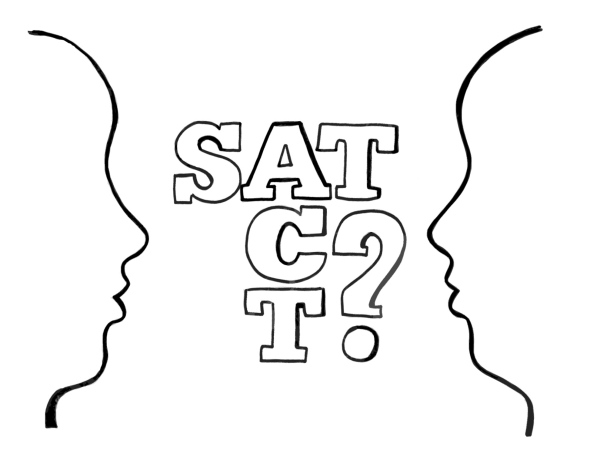Which would you rather take?
SAT?
Not many people enjoy the Scholastic Aptitude Test; to be honest, standardized tests are not necessarily a favorite for high schoolers. Most colleges require the SAT for admission, and the Collegeboard offers many reasons why the SAT is the test to take over the ACT. The SAT is well timed. Unlike the ACT, the number of questions on the SAT is manageable within the 25, 15, and 10 minute sections. By section, the math has about one problem per 1.4 minutes, the reading has around one minute per question, and the writing has 1.4 minutes per section. These questions are also ranked from easier to harder, allowing students to use their time wisely. The ACT questions are jam-packed into the sections, while longer sections, the question number is almost triple that of the SAT. Also, the ACT includes science as one of the sections, which uses graphs and text based information. This is the lowest overall scoring section, and generally the hardest. The SAT test has more complicated questions, but less complicated passages and numbers. The ACT has straightforward questions, but difficult readings.
At Oakton, the SAT average was 1753 in 2010.
There are also more breaks. There are three 5 minute breaks spaced between the ten SAT sections. This is just enough time to run out to the bathroom, or eat a small snack. While the snack is not the most fulfilling or relaxing, it is a much needed stretch break. The Collegeboard claims that the SAT is easy for any student because it requires only basic algebra and no other prior knowledge (other than literacy). This is generally true: if students can receive good SAT preparation, via a tutor or a class, they will score much higher than the national average. On a 2400 scale, the nationwide average is a 1500. At Oakton, the average was 1753 in 2010. Considering how wealthy FCPS is, it is no shock that our average is much higher than the national one. The SAT is a better choice if you can receive prep and are accustomed to less specific questions.
ACT?
While sometimes the American College Test or ACT is viewed as the “back-up plan,” the ACT was taken by over 1.7 million students across the United States in 2013, and is accepted by all 4-year colleges in the United States. In fact, many students who have taken both the SAT and the ACT find that they perform better on the ACT overall. The nationwide average is 21.2 and Oakton High School’s average falls at a 24.4.
The test is formatted slightly differently than the SAT in that in addition to the normal writing, reading, and math sections, there is a science portion. It tests how well students can read an interpret graphs and basic scientific concepts.
Unlike the SAT, the reading, writing, math, and science sections are not broken apart. While completing 60 math questions in a row may seem overwhelming to some students, it will be a relief to others knowing that they have completely finished that section and are free to worry about other portions of the test.
Also, the essay, which is optional, comes at the end of the test and does not affect your composite score. A total time of 30 minutes is given, which is a full five minutes longer than the SAT. While five minutes may not seem like that much, during a stressful timed writing any extra time for planning or edits is crucial in getting a high score.
Many students also appreciate the more “straight forward” nature of the questions on the ACT. There is less abstract thinking and more understanding at face value. This is because the ACT is geared towards achievement and measuring actual content learned in high schools. However, this inclusion of more learned concepts also entails a more advanced math section. But for those wishing to attend college, the included trigonometry is taught in pre-calculus, a course many college-bound students already take.
The ACT is a perfectly legitimate test that students occasionally believe is not preferred by colleges or is much more difficult than the SAT. While math and science are advanced on the test, the sections are straight forward overall. If you’re thinking about college in the nearby future, the ACT should definitely be considered in your journey.





